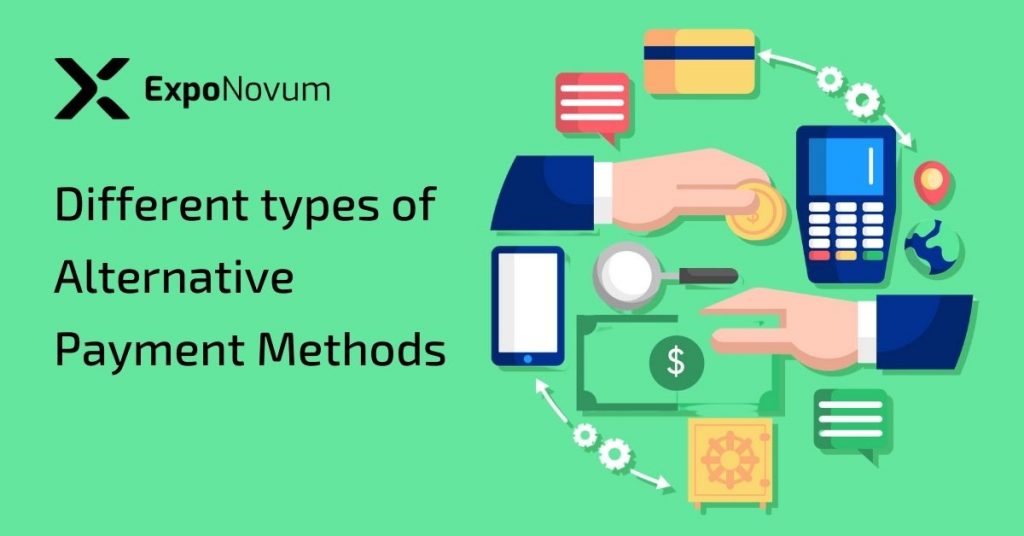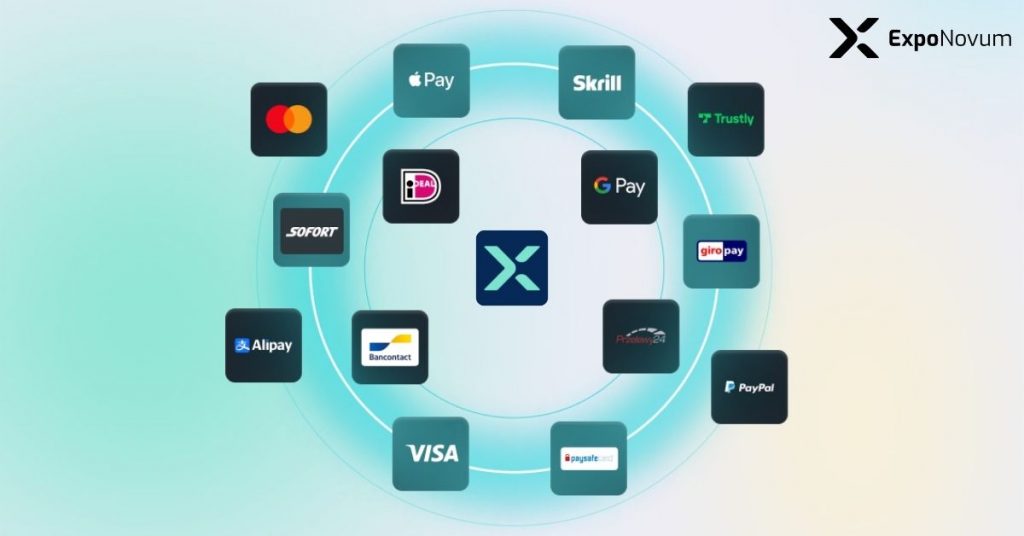What are Alternative Payment Methods?
Alternative payment methods, also known as alternative payment solutions or online payment methods, refer to any payment method that is not a traditional credit or debit card. These methods are often used as an alternative to traditional methods because they offer additional benefits or cater to a specific audience.
Alternative payment methods offer a range of benefits to both merchants and consumers. Merchants can increase their customer base by offering a variety of payment options and reducing the risk of fraud. For consumers, alternative payment methods can provide an additional level of security and convenience.

Different types of alternative payment methods
Alternative methods are often used as an alternative to traditional methods because they offer additional benefits or cater to a specific audience.
There are many different types of alternative payment methods, and each one has its unique features and benefits.
Here are some of the most common types:
Mobile payments
Mobile payment solutions, such as Apple Pay or Google Pay, allow users to make payments using their mobile devices. This is convenient for people who do not have a traditional credit or debit card or prefer not to use one for online transactions.
E-wallets
E-wallets, such as PayPal or Skrill, are digital wallets that allow users to store their payment information in one place and make payments online or in person without having to enter their payment details each time.
Prepaid cards
Prepaid cards are a type of payment card that is loaded with a fixed amount of money in advance. They can be used like regular debit or credit cards to make purchases online or in-store. Prepaid cards are a good option for those who do not have a bank account or credit card, or for those who want to limit their spending.
Digital currencies
Digital currencies are a form of virtual currency that can be used to make purchases online or in-store. They can be stored in an online wallet or on a special digital currency card. Examples of digital currencies include Amazon Coins and World of Warcraft Gold.
Mobile banking
Mobile banking is a service offered by some banks that allows customers to access their accounts and make transactions using their mobile phones. This can include paying bills, transferring money, and checking account balances. Mobile banking is a convenient and secure alternative to traditional banking methods.
Cryptocurrencies
Cryptocurrencies, such as Bitcoin or Ethereum, are decentralized digital currencies that use cryptography for secure financial transactions. They offer a level of anonymity and can be used to make payments online or in person.
Direct debit
Direct debit is a payment method where the payer’s bank account is directly debited by the payee. This is often used for recurring payments, such as monthly subscriptions or utility bills.
Bank transfers
Bank transfers, also known as wire transfers, allow users to transfer funds directly from their bank account to another person or business. This is a common method for making large payments or for transferring money internationally.
Cash on delivery (COD)
COD is a payment method where the customer pays for the goods or services in cash at the time of delivery. This is often used for online purchases where the customer does not have a credit or debit card or does not want to use one online.
Payment gateways
Payment gateways, such as Stripe or Braintree, allow merchants to accept online payments from their customers. They act as an intermediary between the merchant and the customer’s bank, securely transmitting the payment information and processing the transaction.
Invoice payments
Invoice payments allow customers to pay for goods or services at a later date, typically after receiving an invoice. This is often used for business-to-business transactions or large purchases.
Gift cards and vouchers
Gift cards and vouchers are prepaid cards that can be used to make purchases at specific merchants or online. They are often given as gifts or used as an alternative to traditional payment methods.
Alternative payment methods offer consumers and businesses a variety of options for making transactions. They are generally faster, more convenient, and more secure than traditional payment methods, and they are becoming increasingly popular as more and more people embrace technology and the digital economy.

What Roles Do APMs Play in E-commerce?
Alternative payment methods (APMs) play a crucial role in the success of e-commerce businesses. APMs are any payment method that is not a traditional credit card or bank transfer, and they provide consumers with more options for making online purchases. Here are some of the key roles that APMs play in e-commerce:
Increased convenience
APMs offer consumers more convenient ways to make online purchases. For example, mobile payments allow consumers to make transactions using their smartphones or other mobile devices, while online wallets allow users to store their payment information and make transactions without entering their card details each time. This makes it easier and faster for consumers to complete their purchases, which can lead to increased sales for businesses.
Greater security
APMs use advanced encryption and other security measures to protect the personal and financial information of consumers. This can help to reduce the risk of fraud and other security breaches, which can be a major concern for both consumers and businesses.
Expansion of the customer base
APMs can help e-commerce businesses to reach new customers who may not have a traditional credit card or bank account. Prepaid cards, for example, allow consumers to make purchases even if they do not have a bank account or credit card, while cryptocurrencies can be used by anyone with an internet connection. This can help businesses to expand their customer base and reach a wider market.
Increased international sales
APMs can make it easier for businesses to sell internationally, as they allow consumers in different countries to make transactions using a variety of payment methods. For example, PayPal is widely accepted in many countries, while mobile payments and online wallets can be used in countries where traditional credit card use is less common. This can help businesses to tap into the global market and increase their international sales.
In summary, APMs play a vital role in the success of e-commerce businesses by providing consumers with convenient and secure options for making online purchases. By offering a variety of APMs, businesses can increase their sales, expand their customer base, and tap into the global market.
What are the benefits of alternative payment methods?
Alternative payment options have become increasingly popular in recent years due to the convenience, security, and flexibility they offer to both consumers and merchants.
Here are the top seven benefits of alternative payment methods:
Convenience
Alternative payment methods are often more convenient than traditional payment methods, as they allow consumers to make purchases quickly and easily without the need to carry cash or credit cards. For example, mobile payment options like Apple Pay and Google Pay allow consumers to make purchases using their smartphones, while online payment options like PayPal and Venmo allow consumers to make payments directly from their bank accounts.
Robust Security
Alternative payment methods often offer added security features to protect against fraud and identity theft. For example, many alternative payment methods use secure encryption techniques to protect sensitive financial information, and some even offer additional security measures like two-factor authentication.
Highly Flexible
Alternative payment methods offer more flexibility to consumers, as they can be used to make purchases online, in-store, or through mobile apps. This makes it easier for consumers to shop and pay for goods and services wherever they are, whether they are at home or on the go.
International Payment Options
Alternative payment methods can make it easier for consumers and merchants to make and receive payments internationally. For example, PayPal and Stripe allow for easy international payments and currency conversions, which can be especially useful for online merchants who sell to customers around the world.
Very Low Costs & Fees
Alternative payment methods may offer lower fees than traditional payment methods, which can be beneficial for both consumers and merchants. For example, PayPal and Stripe charge lower fees for online transactions than credit card companies, which can result in cost savings for merchants.
Super Fast Process
Alternative payment methods often allow for faster transaction processing than traditional payment methods, as they do not require the same level of manual processing and approval. This can be especially useful for merchants, as it allows for quicker payment processing and reduces the risk of fraud.
Customer loyalty
Alternative payment methods can help merchants build customer loyalty, as they make it easier for customers to make purchases and provide a more seamless shopping experience. For example, a merchant that accepts mobile payment options like Apple Pay or Google Pay may be more attractive to consumers who prefer these payment methods, which can lead to increased customer loyalty and repeat business.
Moreover, alternative payment methods offer a range of benefits to both consumers and merchants, including convenience, security, flexibility, and lower fees. As more and more consumers turn to non-traditional payment methods, merchants need to consider offering these options to their customers.
Which alternative payment methods are right for my business?
It depends on the needs of your business and your customer base. Some businesses may find that a combination of different payment methods works best.
Here are a few factors to consider when deciding which alternative payment methods to offer:
Customer demographics
Different payment methods are more popular with certain demographics. For example, younger customers may be more open to using digital wallets or mobile payments, while older customers may prefer more traditional methods. Consider your customer base and what payment methods they are most likely to use.
Transaction fees
Different payment methods come with different transaction fees. Credit and debit card payments typically have the highest fees, while digital wallets and mobile payments can have lower fees. Consider the cost of each payment method and how it will impact your bottom line.
Security
Security is an important consideration when it comes to payment methods. Some methods, like cryptocurrency, offer a high level of security, while others, like prepaid cards, may not be as secure. Consider the level of security each payment method offers and how important it is for your business.
Ease of use
Some payment methods are easier to use than others. For example, digital wallets and mobile payments can be easily set up and used on smartphones, while other methods may require more setup and technical knowledge. Consider the ease of use for both you and your customers when choosing a payment method.
Geographical Considerations
Some payment methods may not be available in certain countries or regions. If you have a global customer base, you may need to offer multiple payment options to accommodate different regions.
Ultimately, the right alternative payment method for your business will depend on your specific needs and customer demographics. Consider the factors outlined above and do some research to determine which payment method is the best fit for your business.
How to add alternative payment methods to my business?
Adding alternative payment methods to your business can be a great way to offer more convenience and flexibility to your customers. In this blog, we’ll go over the steps you need to take to add alternative payment methods to your business.
Research your options
The first step in adding alternative payment methods to your business is to research your options. Some popular alternative payment methods include digital wallets, mobile payments, cryptocurrency, and prepaid cards. Consider which payment methods are most popular with your target customer demographic and which ones align with your business goals.
Consider the fees
Different payment methods come with different fees. Credit and debit card payments typically have the highest fees, while digital wallets and mobile payments can have lower fees. Consider the cost of each payment method and how it will impact your bottom line.
Determine the security measures
Security is an important consideration when it comes to payment methods. Some methods, like cryptocurrency, offer a high level of security, while others, like prepaid cards, may not be as secure. Determine the level of security each payment method offers and how important it is for your business.
Evaluate the ease of use
Some payment methods are easier to use than others. For example, digital wallets and mobile payments can be easily set up and used on smartphones, while other methods may require more setup and technical knowledge. Consider the ease of use for both you and your customers when choosing a payment method.
Set up the payment method
Once you’ve chosen the payment method you want to use, you’ll need to set it up. This process will vary depending on the payment method you choose. Some methods, like digital wallets and mobile payments, can be easily set up through an app or website. Other methods, like cryptocurrency, may require more technical knowledge and setup.
Test the payment method
Once you’ve set up the payment method, it’s a good idea to test it out to make sure it’s working properly. This can help you catch any issues before you start accepting payments from customers.
Promote the payment method
Once you’ve set up and tested your payment method, it’s important to let your customers know about it. Include information about your alternative payment options on your website and in your marketing materials.

ExpoNovum can help you leverage your alternative payment methods
ExpoNovum is a payment solution provider that helps businesses leverage alternative payment methods to increase their revenue and customer satisfaction.
ExpoNovum can help businesses leverage alternative payment methods in several ways. First, they offer a range of payment gateway solutions that allow businesses to easily accept a variety of alternative payment methods. These solutions are easy to integrate with existing e-commerce platforms and can be customized to meet the specific needs of the business.
In addition to payment gateway solutions, ExpoNovum also provides support and consulting services to help businesses navigate the world of alternative payments. Their team of experts can help businesses identify the best payment methods for their specific market and guide them through the process of integrating these methods into their payment system.
Overall, ExpoNovum is a valuable resource for businesses looking to leverage alternative payment methods to increase their revenue and customer satisfaction. By offering a range of payment gateway solutions and expert consulting services, they can help businesses tap into new markets and reduce the risk of fraud and chargebacks.
Check out APM Service by ExpoNovum Now!